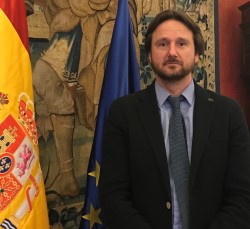Committee on Artificial Intelligence (CAI)

The Council of Europe Framework Convention on Artificial Intelligence and Human Rights, Democracy and the Rule of Law was adopted on 17 May 2024 by the Committee of Ministers of the Council of Europe at its 133th Session held in Strasbourg, and opened for signature on the occasion of the Conference of Ministers of Justice in Vilnius (Lithuania) on 5 September 2024.
Framework Convention on Artificial Intelligence and Human Rights, Democracy and the Rule of Law

With the signature in Vilnius on 5 September 2024 by the first countries (Andorra, Georgia, Iceland, Norway, the Republic of Moldova, San Marino, the United Kingdom, Israel, the United States of America) and the European Union (on behalf of its twenty-seven member States) the Framework Convention on Artificial Intelligence and Human Rights, Democracy and the Rule of Law has become the first-ever international legally binding treaty in this field. Montenegro soon after became the treaty's 11th Signatory. This is happy news for all of us who believe in the essential values of the human being.
In addition to its intrinsic value, the Framework Convention has a double added value which distinguishes it and which is easily recognisable in its articles.
First, as a result of the universal vocation of the Council of Europe, the Framework Convention is open for signature by countries that are not member states, regardless of having been part of the CAI during the drafting and negotiation of the Framework Convention, such as Argentina, Australia, Canada, Costa Rica, the Holy See, Israel, Japan, Mexico, Peru, Uruguay and the United States, along with the European Union. Its principles and obligations to ensure that the life-cycle activities of artificial intelligence systems are fully consistent with human rights, democracy and the rule of law are intended to constitute a standard in all societies where human beings are at their core, irrespective of their geographical location.
Second, the Framework Convention adopts an approach based on the severity and likelihood of a negative impact on human rights, democracy and the rule of law by AI systems. This requires a methodology to guide and assist in identifying contexts and applications where the deployment of AI systems could pose risks to the enjoyment of human rights, the functioning of democracy and the observance of the rule of law, and to assess and mitigate these risks. The development of this methodology, called HUDERIA (acronym for Human Rights, Democracy and Rule of Law Impact Assessment) is the main focus of the CAI's work at present. Although it is not legally binding in nature, and other human rights risk and impact methodologies already exist, HUDERIA constitutes an important added value as it not only combines for its design the technical aspects of AI together with the socio-technical context of its development and application, but also incorporates the entire legal acquis of the Council of Europe not only in terms of human rights, but especially in terms of democracy and the rule of law.
The elaboration of HUDERIA is a difficult challenge at all levels, which again requires the commitment and effort of each and every member of the Committee. All representatives of States, civil society, stakeholders and NGOs were up to the task in the elaboration of the Framework Convention, and have continued to be so, as they demonstrated during the 11th Plenary meeting where the first draft of HUDERIA was discussed.
This is why this new Chair, Vice-chair and the 7 Bureau members elected at the 11th Plenary meeting, with the help of the Secretariat, will work with passion and enthusiasm in directing the work of the CAI, a Committee which after more than 4 years of work (which started with the CAHAI in December 2019 which was succeeded by the CAI in early 2022) is beginning to feel like a small big family.
I am convinced that together we will successfully complete this task, and the Council of Europe will be able to provide the world with another instrument for the protection of rights, democracy and the rule of law.
Mario HERNANDEZ RAMOS (Spain)
Chair of the CAI
Composition
The Committee brings together:
- representatives of the 46 member States, designated by their respective governments, and who have recognised expertise in the field of digital governance and the legal implications of the functioning of different forms of AI ;
- representatives of the observer States, namely Argentina, Australia, Cameroon, Canada, Costa Rica, the Holy See, Israel, Japan, Mexico, Peru, the United States of America, Uruguay;
- representatives of other Council of Europe bodies and sectors, in particular the Secretariat of the Parliamentary Assembly, the Office of the Commissioner for Human Rights, and intergovernmental committees dealing with issues pertaining to artificial intelligence;
- representatives of other international and regional organisations working in the field of artificial intelligence such as the European Union, the United Nations (in particular UNESCO), the OECD or the OSCE;
- representatives of the private sector, including companies and associations with which the Council of Europe has concluded an exchange of letters under the partnership with digital businesses;
- representatives of civil society, research and academic institutions which have been admitted as observers by the CAI.
Meetings
1st Meeting, 4 - 6 April, 2022
Agenda
List of participants
List of decisions
2nd Meeting, 21 - 23 September 2022
Agenda
List of participants
List of decisions
3rd Meeting, 11 - 13 January 2023
Agenda
List of participants
List of decisions
4th Meeting, 1 - 3 February 2023
Agenda
List of participants
List of decisions
5th Meeting, 19 - 21 April 2023
Agenda
List of participants
List of decisions
6th Meeting, 31 May - 2 June 2023
Agenda
List of participants
List of decisions
7th Meeting, 24-26 October 2023
Agenda
List of participants
List of decisions
8th Meeting, 5-8 December 2023
Agenda
List of participants
List of decisions
9th Meeting, 23-26 January 2024
Agenda
List of participants
List of decisions
10th Meeting, 11-14 March 2024
Agenda
List of participants
List of decisions
11th Meeting, 17-19 September 2024
Agenda
List of participants
List of decisions
12th Meeting, 26-28 November 2024
Agenda
List of participants
List of decisions
Composition
The Bureau of the CAI is composed as follows:
- Mr Mario HERNÁNDEZ RAMOS (Spain) Chair
- Mr Thomas SCHNEIDER (Switzerland) Vice-Chair
The Committee elected for the duration of its mandate the following Bureau members:
- Mr Jordi ASCENSI SALA (Andorra)
- Ms Isil Selen DENEMEC (Türkiye)
- Mr Jasper FINKE (Germany)
- Mr Dimitri GUGUNAVA (Georgia)
- Mr Floris KREIKEN (Netherlands)
- Ms Maria NORDSTRÖM (Sweden)
- Mr Amit THAPAR (United Kingdom)
Meeting
1st Meeting, 24 May 2022
Agenda
Meeting Report
2nd Meeting, 4 November 2022
Agenda
Meeting Report
3rd Meeting, 5 January 2023
Agenda
Meeting Report
4th Meeting, 2 March 2023
Agenda
Meeting Report
5th Meeting, 4 May 2023
Agenda
Meeting Report
6th Meeting, 15 June 2023
Agenda
Meeting report
7th Meeting, 7 September 2023
Agenda
Meeting report
8th Meeting, 8 November 2023
Agenda
Meeting report
9th Meeting, 12 January 2024
Meeting report
10th Meeting, 13 November 2024
Agenda
Meeting report



